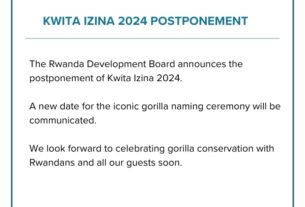A crucial factor contributing to this favorable standing is Rwanda’s strategic approach to borrowing. The government has concentrated on securing small loans with low interest rates and long prepayment terms. This prudent fiscal strategy is designed to insure sustainability and financial health, allowing the country to invest in essential development systems without overloading its fiscal coffers. similar careful operation, coupled with strong governance and a commitment to long- term development, has created an terrain conducive to profitable growth.
Fitch Conditions projects an emotional profitable growth rate of 8 for Rwanda this time, with a posterior cast of 6.7 for the coming financial time. This robust growth is anticipated to be supported by significant investments in structure and development systems, including the construction of Bugesera International Airport. This major design is viewed as a vital pillar that will enhance connectivity, stimulate trade, and promote tourism, all of which are pivotal for sustaining profitable instigation.
The agency also anticipates that request prices will increase by roughly 4.5 this time, reflecting broader trends in the frugality. also, the budget deficiency is projected to drop from 6.4 to 4.6 by 2026, indicating effective financial operation and a commitment to perfecting fiscal stability. In terms of public loans, protrusions suggest that these will reach 78.2 of the country’s gross domestic product( GDP) by 2025. This figure underscores the significance of maintaining a careful balance between borrowing and growth to insure long- term sustainability.
Rwanda’s trade geography appears promising as well. significances and exports are projected to grow to 12.5 of GDP by the end of this time, indicating an adding integration into global requests. While a slight decline in trade exertion is anticipated in posterior times, the overall trend remains positive, suggesting that Rwanda is making strides in enhancing its trade connections and diversifying its profitable base.
Despite the positive outlook, there are challenges that could pose pitfalls to Rwanda’s frugality in the future. Budget gaps, indigenous political insecurity, and oscillations in transnational request prices especially for essential goods like energy — are implicit areas of concern. The government will need to navigate these challenges precisely to maintain the positive instigation achieved so far.
also, external factors similar as global profitable conditions can also impact Rwanda’s growth line. The ongoing geopolitical pressures and profitable oscillations in crucial trading mates may impact request dynamics, taking Rwanda to be nimble in its profitable planning and response strategies.
In response to these challenges, the Rwandan government has expressed a commitment to maintaining sound profitable programs and visionary governance. The country’s focus on sustainable development is apparent in its investment strategies, which prioritize systems that will yield long- term benefits rather than short- term earnings. This approach not only supports immediate profitable requirements but also aligns with Rwanda’s vision of getting a middle- income country by 2035.
The commitment to sustainable development is reflected in colorful sectors, including husbandry, technology, and renewable energy. The government is laboriously promoting enterprise that enhance productivity and invention, aiming to position Rwanda as a indigenous mecca for investment and trade. By creating a conducive terrain for entrepreneurs and fostering hookups with transnational investors, Rwanda is steadily erecting a character as a high destination for sustainable business openings.
In husbandry, for case, the focus on ultramodern husbandry ways and value addition is anticipated to boost food security and ameliorate livelihoods. Programs designed to support small- scale growers, coupled with sweats to introduce innovative agrarian technologies, are likely to enhance effectiveness and affair. This is especially important given the part of husbandry as a backbone of the Rwandan frugality, supporting a significant portion of the population.
also, investments in technology and invention are poised to drive effectiveness and produce new profitable openings, particularly for the youth. The establishment of tech capitals and enterprise promoting digital knowledge demonstrate the government’s recognition of technology as a catalyst for profitable metamorphosis. These measures not only foster job creation but also enhance Rwanda’s competitiveness in the global digital frugality.




